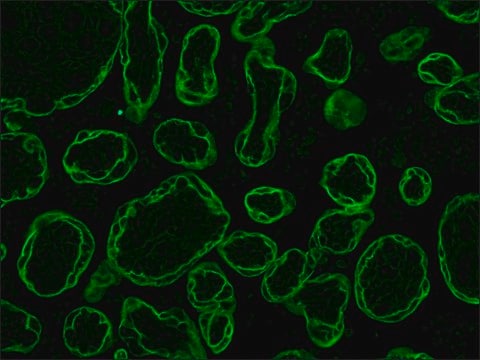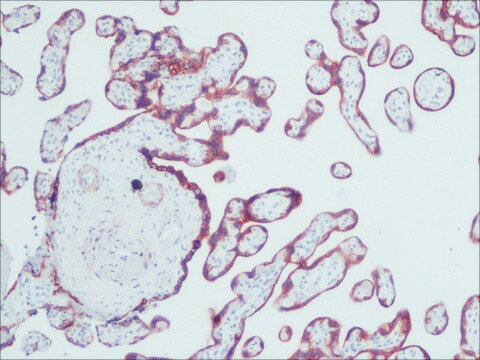推薦產品
生物源
mouse
共軛
unconjugated
抗體表格
ascites fluid
抗體產品種類
primary antibodies
無性繁殖
6B10, monoclonal
分子量
antigen 59 kDa
包含
15 mM sodium azide
物種活性
rabbit, feline, hamster, goat, guinea pig, human, canine, sheep
技術
immunohistochemistry (formalin-fixed, paraffin-embedded sections): suitable
immunohistochemistry (frozen sections): suitable
indirect immunofluorescence: 1:300 using formalin-fixed, paraffin-embedded sections of human or animal tissue
microarray: suitable
western blot: suitable
同型
IgG1
UniProt登錄號
運輸包裝
dry ice
儲存溫度
−20°C
目標翻譯後修改
unmodified
基因資訊
human ... KRT4(3851)
一般說明
Cytokeratins are intermediary filaments that are expressed during epithelial development. Cytokeratin-4 is largely found in non-epidermal, stratified epithelial tissues such as larynx, pharynx, vagina, exocervix and epiglottis among several others . Cytokeratin-4 has been implicated in Streptococcus agalactiae infection and genetic mutations in Cytokeratin-4 have been linked to white sponge naevus . Monoclonal Anti-Cytokeratin Peptide 4 antibody is specific for cytokeratin 4 in goats, hamsters, guinea pigs, cats, sheep, humans, rabbits, and dogs. The antibody weakly stains ciliated pseudostratified epithelium of bronchi. Ducts of skin sweat glands and prostate are focally stained by the antibody. Some endocervical columnar cells may also react with the antibody. This antibody is reactive with methanol or acetone fixed frozen sections, and with protease-digested formalin fixed paraffin embedded human tissues. Embedded methacarn fixed material can also be used for cytokeratin 4 demonstration.
特異性
The antibody reacts with non-cornifying squamous epithelium (e.g., exocervix, esophagus and cornea). Ciliated pseudostratified epithelium of bronchi is weakly stained. Ducts of sweat glands and prostate are focally stained. The antibody may react with some endocervical columnar cells.
免疫原
cytokeratin from human esophagus.
應用
Monoclonal Anti-Cytokeratin Peptide 4 antibody is suitable for use in a broad range of immunoassays such as immunohistochemistry (frozen or formalin-fixed, paraffin-embedded sections), immunoblot, dot blot, and indirect immunofluorescence (1:300 using formalin-fixed, paraffin-embedded sections of human or animal tissue). The antibody may also be used for western blot and microarray.
免責聲明
Unless otherwise stated in our catalog or other company documentation accompanying the product(s), our products are intended for research use only and are not to be used for any other purpose, which includes but is not limited to, unauthorized commercial uses, in vitro diagnostic uses, ex vivo or in vivo therapeutic uses or any type of consumption or application to humans or animals.
未找到適合的產品?
試用我們的產品選擇工具.
儲存類別代碼
10 - Combustible liquids
水污染物質分類(WGK)
nwg
閃點(°F)
Not applicable
閃點(°C)
Not applicable
分析證明 (COA)
輸入產品批次/批號來搜索 分析證明 (COA)。在產品’s標籤上找到批次和批號,寫有 ‘Lot’或‘Batch’.。
Dianlei Guo et al.
Experimental eye research, 180, 208-225 (2018-12-28)
Ocular surface disease is one major type of eye diseases. Different etiologies trigger distinct pathological responses of the ocular surface. We previously reported that genetically engineered mice with ablation of Prickle 1 manifested precocious eyelid opening with ensuing cornea dysplasia.
Tamsin R Sheen et al.
Journal of bacteriology, 193(24), 6834-6842 (2011-10-11)
Streptococcus agalactiae (group B streptococcus [GBS]) is a Gram-positive bacterium found in the female rectovaginal tract and is capable of producing severe disease in susceptible hosts, including newborns and pregnant women. The vaginal tract is considered a major reservoir for
S-C Chao et al.
The British journal of dermatology, 148(6), 1125-1128 (2003-06-28)
White sponge naevus (WSN) is a rare, autosomal dominant disorder that predominantly affects noncornified stratified squamous epithelia, most commonly the buccal mucosa. Clinically, WSN manifests as thickened spongy mucosa with a white opalescent tint in the mouth and may be
Ulrike Samen et al.
Infection and immunity, 75(11), 5405-5414 (2007-08-22)
Streptococcus agalactiae is frequently the cause of bacterial sepsis and meningitis in neonates. In addition, it is a commensal bacterium that colonizes the mammalian gastrointestinal tract. During its commensal and pathogenic lifestyles, S. agalactiae colonizes and invades a number of
R E Leube et al.
The Journal of cell biology, 106(4), 1249-1261 (1988-04-01)
A number of human cytokeratins are expressed during the development of stratified epithelia from one-layered polar epithelia and continue to be expressed in several adult epithelial tissues. For studies of the regulation of the synthesis of stratification-related cytokeratins in internal
我們的科學家團隊在所有研究領域都有豐富的經驗,包括生命科學、材料科學、化學合成、色譜、分析等.
聯絡技術服務






